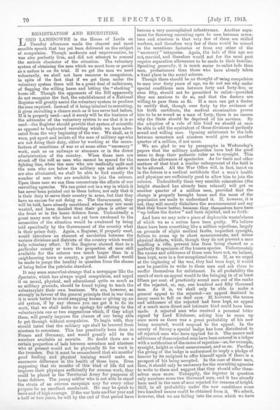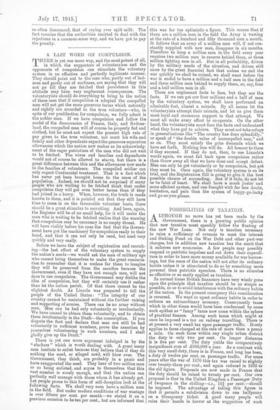REGISTRATION AND RECRUITING.
TORD LANSDOWNE in the House of Lords on A Tuesday afternoon made the clearest and most sensible speech that has yet been delivered on the subject of compulsion. Though moderate and unprovocative, he was also perfectly firm, and did not attempt to conceal the serious character of the situation. The voluntary system of obtaining the men which we must have or perish as a nation is on its trial. If we get the men wo need voluntarily, we shall not have recourse to compulsion, in spite of the fact that if we get them under the voluntary system there will be a great deal of unfairness, of flogging the willing horse and letting the " slacking " horse off. Though the opponents of tho Bill apparently do not recognize the fact, the establishment of a National Register will greatly assist the voluntary system to produce the men required. Instead of it being inimical to recruiting, it gives recruiting a chance such as it has never had before. If it is properly used—and it surely will be the business of the advocates of the voluntary system to see that it is so need—the Register should provide that system of scientific as opposed to haphazard recruiting which we have advo- cated from the very beginning of the war. We shall, as it were, put apart and isolate all the men of military age who are not doing their duty, either by working at the manu- facture of munitions of war or at some other "necessary" work, such as on railways or steamers or in the direct administration of the country. When those men are struck off the roll as men who cannot be spared for the fighting line, when the men who are medically unfit and the men who are below the military age and above it are also eliminated, we shall be able to find exactly the number of men who are available to join the colours. Upon these men we can then concentrate the efforts of our recruiting agencies. We can point out inn way in which it has never been pointed out to them before, not only that it is their duty to serve their country in arms, but that they have no excuse for not doing so. The Government, they will be told, have already considered where they are most wanted, and have decided. that their place is either at the front or in the home defence force. Undoubtedly a great many men who have not yet been awakened to the necessities of the situation would be awakened by being told specifically by the Government of the country what is their prime duty. Again, a Register, if properly used, would introduce an element of emulation between the various divisions and districts of the country which would help voluntary effort. If the Register showed that in a particular county or town the proportion of men still *reliable for the colours was much larger than in a neighbouring town or county, a great local effort would be made to purge the locality in question from the shame of being below the patriotic standard.
It may seem somewhat strange that a newspaper like the Spectator, which has always urged compulsion, and urged it on moral, physical, and educational quite as much as on military grounds, should be found trying to teach the voluntaryists their own business. We are, however, so strongly in favour of the general principle that in war time it is much better to avoid swapping horses or giving up an old system, if by any chance you can get it to do its work, that we shall make no apology for offering to the voluntaryists one or two suggestions which, if they adopt them, will greatly improve the chance of our being able to get through without compulsion. To begin with, they should insist that the military age shall be lowered from nineteen to seventeen. This has practically been done in France and Germany, and would greatly add to the numbers available as recruits. No doubt there are a certain proportion of lads between seventeen and nineteen who at present would not be physically fit for work in the trenches. But it must be remembered that six months' good feeding and physical training would make an enormous difference in the health of these boys. Even supposing that six months of this kind of life did not improve their physique sufficiently for oversee, work, they could be placed in the Territorial Army for jmrposes of home defence. The young soldier who is not able to stand the strain of an oversee campaign may for every other purpose be an excellent combatant. He may be quick to learn and of high courage. If the war lasts another year and a half or two years, he will by the end of that period have become a very accomplished infantryman. Another argu- ment for throwing recruiting open to men between seven- teen and nineteen is that very few of them are skilled workers, and therefore very few of them would be missed in the munitions factories or from any other of the "necessary" categories. Again, the lads of this age are note married, and therefore would not for the most part require separation allowances to be made to their families. Speaking generally, it is much easier to enlist lads than men, probationers than those who have already taken a fixed place in the social scheme.
Though there should be no thought of using compulsion to men over forty years of age, we do not see why under special conditions men between forty and forty-five, or even fifty, should not be permitted to enlist—provided they are anxious to do so, and that the doctors are willing to pass them as fit. If a man can get a doctor to certify that, though over forty by the evidence of his birth certificate, the medical examination proves him to be as sound as a man of forty, there is no reason why the State should be deprived of his services. By the adoption of a rule of this kind we should at once be able to add the equivalent of three divisions of perfectly sound and willing men. Opening enlistment to the lads between seventeen and nineteen would give us another quarter of a million, if not more.
We are glad to see by paragraphs in Wednesday's papers that the military authorities have had the good' sense to drop their pedantic rules as to eyesight. This means the allowance of spectacles. As for teeth and other matters of that kind a similar enlargement of the field is to be allowed. All the War Office will, in fact, insist on in the future is a medical certificate that a man's health and physique are sufficiently good to allow him to join the colours. Undoubtedly these very sensible relaxations (the height standard has already been relaxed) will get us another quarter of a million men, provided that the change is properly brought home and the mass of the population are made to understand it. If, however, it is not, they will merely disbelieve the announcement and say that they know better, because they themselves have been "up before the doctor" and been rejected, and so forth.
And here we may note a piece of deplorable wastefulness of which we as a nation have been guilty. We believe there have been something like a million rejections, largely on grounds of slight medical faults, imperfect eyesight, failure to come up to chest measurements, and minor physical defects, which, though they do not prevent a man handling a rifle, prevent him from being classed as a. perfectly fit specimen of the human species. Unfortunately the names and addresses of these men have not, we believe, been kept, save in a few exceptional cases. If, as we urged at the beginning of the war, they had been kept, it would now be possible to write to these men and ask them to rooffer themselves for enlistment. In all probability the result of such an appeal would be the bringing in of at least fifteen per cont. of practically sound men out of the ranks of the rejected, or, say, one hundred and fifty thousand men. As it is, we shall only be able to make a, general appeal to the rejected—an appeal destined in ninny cases to fall on deaf ears. If, however, the names and addresses of the rejected had boon kept, an appeal of a much more direct and intimate kind could have been made. A rejected man who received a personal letter signed by Lord Kitchener, asking him to come up once more as there was a great probability of his now being accepted, would respond to the appeal. In the county of Surrey a special badge has been distributed to all rejected men who have applied for it. The names and addresses of these rejected men have been entered in a ledger with a notification of the cause of rejection—as, for example, eyesight, height or chest measurement, and so on. Further, the giving of the badge is understood to imply a pledge of honour by its recipient to offer himself again if there is a prospect of his being accepted. In the case of these men, then, it should only be necessary for the recruiting agencies to write to them and suggest that they should offer them- selves once more. Unhappily, the register in question only numbers seine two thousand men, and it has already been used in the case of men rejected for reasons of height. Still, in all probability under the now conditions some two hundred names could be obtained from it. We admit, however, that wo are falling into the error which we have so often denounced, that of crying over spilt milk. The fact remains that the authorities omitted to deal with the rejections in a common-sense way, and we have got to pay the penalty.



































 Previous page
Previous page